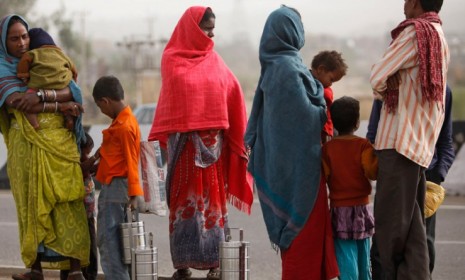5 signs India won't become an economic power
India sees itself as a country on the rise, but stubborn obstacles — including endemic corruption and political gridlock — suggest that it might fall short of its promise

A free daily email with the biggest news stories of the day – and the best features from TheWeek.com
You are now subscribed
Your newsletter sign-up was successful
“As Victor Hugo once said, ‘No power on earth can stop an idea whose time has come.' I suggest to this august house that the emergence of India as a major economic power in the world happens to be one such idea." With those words to the Indian parliament in 1991, then-Finance Minister Manmohan Singh introduced a raft of reforms that loosened his government's stranglehold over the market and sparked years of economic growth that lifted millions out of poverty. Singh, a soft-spoken technocrat, built on those reforms after becoming prime minister in 2004, and until only recently it was a given that India "was on an inexorable road to becoming a global power," says Simon Denyer at The Washington Post. But since winning a second term in 2009, Singh's fortunes have turned — and there are serious doubts that his country, the world's largest democracy, can fulfill its potential. Here, 5 signs India may not become an economic power:
1. The economy is slowing
India's economy grew at a rate of 5.5 percent in the latest quarter, a marked slowdown from the blistering 10 percent pace it was setting a couple of years ago. While most countries — including the U.S. — could only dream of a 5.5 percent rate, India "needs to stay on a high-growth path to pull hundreds of millions" of people out of poverty, says Krista Mahr at TIME. Two-thirds of India's 1.2 billion people live on less than $2 a day, and more than 500 million Indians are under the age of 25, meaning the government "needs to figure out how to guarantee those millions a future of long, gainful employment," says Mahr. If the economy continues to lumber along, those millions in poverty could begin to strain the country's resources and prevent a jump to greater prosperity.
The Week
Escape your echo chamber. Get the facts behind the news, plus analysis from multiple perspectives.

Sign up for The Week's Free Newsletters
From our morning news briefing to a weekly Good News Newsletter, get the best of The Week delivered directly to your inbox.
From our morning news briefing to a weekly Good News Newsletter, get the best of The Week delivered directly to your inbox.
2. Corruption
Corruption is rampant in India, from the top echelons of government to the local police demanding bribes, and many Indians feel that "political parties and their representatives are nothing more than obstacles to doing business," says Erich Follath at Der Spiegel. Singh's government has been wracked by corruption scandals, with opponents accusing officials in his Congress Party of giving sweet deals to politically connected corporations in the telecommunications and coal industries, which ended up costing the government tens of billions of dollars in revenue. The penchant for corruption is a turnoff for foreign companies, and even aid programs for the poor have been hijacked. "On the long road between greedy politicians in New Delhi and corrupt local officials, the money tends to disappear before it reaches the poor," says Follath.
3. Political paralysis
Opposition parties in recent weeks have been hammering Singh over the coal scandal, suspending all parliamentary activity for days running. Similar paralysis accompanied outrage over the telecommunications scandal. In addition, Singh barely has control over his own coalition, which represents "interests from many corners of the vast country" and "has grown particularly unwieldy," says Kahr. With tensions running high, little business has been done since Singh's second term began.
A free daily email with the biggest news stories of the day – and the best features from TheWeek.com
4. Reform has stalled
With the corruption scandals and parliamentary gridlock, the government has failed to pass far-reaching reforms that are considered necessary to catapult India to the next stage of development, such as ending wasteful subsidies and reducing barriers to foreign investment. "It's very clear that it is misgovernance that is holding India back from realizing its potential and blunting its competitive edge," says FirstPost in an editorial. India is falling farther and farther behind in basic areas that need to be improved: "Transport, communication, and energy." The country received a stark reminder of that earlier this summer, when a massive electrical blackout left 700 million people without power.
5. Singh hasn't come through
Singh, who was "once so eager to bring about reform, seems exhausted and tired of his position," says Follath. He has refused to "stick his neck out on reforms that will continue the process of liberalization he helped start," says Kahr. And while he has not been accused of corruption himself, he has steadily developed a reputation as "a dithering, ineffectual bureaucrat presiding over a deeply corrupt government," says Denyer. If he doesn't turn things around soon, Singh "is in danger of going down in history as a failure."
Sources: Der Spiegel, FirstPost, The New York Times, Reuters, Time, The Washington Post
-
 Buddhist monks’ US walk for peace
Buddhist monks’ US walk for peaceUnder the Radar Crowds have turned out on the roads from California to Washington and ‘millions are finding hope in their journey’
-
 American universities are losing ground to their foreign counterparts
American universities are losing ground to their foreign counterpartsThe Explainer While Harvard is still near the top, other colleges have slipped
-
 How to navigate dating apps to find ‘the one’
How to navigate dating apps to find ‘the one’The Week Recommends Put an end to endless swiping and make real romantic connections